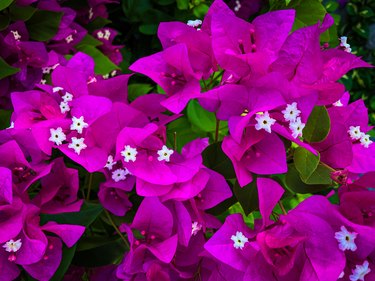
For an easy and spectacular flower display in the garden, warm-climate gardeners can't do better than a bougainvillea plant. These tough shrubs grow fast, offering blooms in brilliant shades as well as sharp thorns. While no part of the plant is reported to be toxic if consumed by human or animal, you need to watch out for their thorns.
Meet the Bougainvillea
Video of the Day
Bougainvilleas (Bougainvillea spp.) are tropical vining shrubs from South America. They put on quite a show, with large bracts in fanciful colors that look like paper flowers. These bracts are a type of modified leaf and appear in remarkable shades of purple, crimson, and violet-pink. The shrubs can flower all year long in the warmest climates.
Video of the Day
The beautiful bracts are the main attraction of this popular garden shrub, but the heart-shaped, deep-green leaves are also attractive. The true flowers are tiny, tubular, and the color of cream. Most varieties of bougainvillea have sharp, curved thorns lining their branches.
These dramatic evergreen vines are both tough and versatile. Each shrub will have several woody trunks that rise to 20 feet with slender, arching canes. While bougainvillea can be pruned into compact shrubs, they are more frequently trained to grow over fences and trellises, creating explosions of color.
Grow the Bougainvillea
If a bougainvillea could tell you its top three cultural requirements, they would likely be sun, sun, and more sun. Despite the plant's endless need for direct sunshine, water comes far down the list. In fact, bougainvilleas prefer dry soil, which makes them a perfect plant for water-sparing gardens. They require little irrigation or fertilizer.
On the other hand, these tropical plants don't like anything that speaks of winter. The plants are hardy in U.S. Department of Agriculture plant hardiness zones 9 through 11 but can be grown in pots in cooler zones if they are brought indoors for the winter. Frosts and freezes can do them in quickly.
Understand the Bougainvillea
Bougainvilleas are not among the flowering plants that are considered edible, but that doesn't mean that they are toxic. They do not make the list of plants toxic to pets put out by the American Society for the Prevention of Cruelty to Animals or any list of shrubs toxic to humans. That means that you could probably eat leaves and flowers without getting poisoned.
On the other hand, the curving thorns make these shrubs armed and dangerous. Before setting out to prune bougainvilleas, put on long sleeves and thick, protective gloves. In addition, coming into contact with the shrub's sap can cause dermatitis. This condition is an itchy or uncomfortable skin rash that usually disappears relatively quickly, but it can be serious and painful.